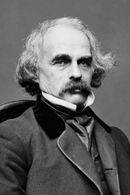Nathaniel Hawthorne was a renowned American novelist, dark romantic, and short story writer, whose literary works frequently explored the realms of history, morality, and religion. Born in 1804 in the historic town of Salem, Massachusetts, Hawthorne hailed from a family with a long and storied connection to the area.
In 1821, Hawthorne embarked on his academic journey, entering Bowdoin College, where he went on to be elected to the prestigious Phi Beta Kappa honor society in 1824 and graduated in 1825. During his formative years, Hawthorne began to develop his writing skills, publishing his first novel, Fanshawe, in 1828, although he would later attempt to suppress it, deeming it inferior to his later works.
Throughout the 1830s, Hawthorne continued to hone his craft, publishing a series of short stories in periodicals, which he would later collect and publish as Twice-Told Tales in 1837. In 1839, he became engaged to Sophia Peabody, and the couple's relationship would become a significant source of inspiration for his future works.
In the years that followed, Hawthorne worked at the Boston Custom House and joined the transcendentalist community at Brook Farm, before ultimately marrying Sophia Peabody in 1842. The couple would go on to move to The Old Manse in Concord, Massachusetts, before relocating to Salem, the Berkshires, and finally settling at The Wayside in Concord.
It was during this period that Hawthorne penned his magnum opus, The Scarlet Letter, which was published in 1850 and would go on to become one of his most celebrated works. This was followed by a succession of other novels, each one showcasing his unique blend of moral metaphors and anti-Puritan inspiration.
In 1860, Hawthorne accepted a political appointment as consul, which led to a period of time spent in Europe with his family. Upon their return to Concord, Hawthorne would continue to write until his untimely death on May 19, 1864, leaving behind a legacy that would endure for generations to come.
Throughout his literary career, Hawthorne's works were characterized by their exploration of the inherent evil and sin of humanity, as well as their moral messages and deep psychological complexity. His writing often centered on the region of New England, and his fiction is widely regarded as part of the Romantic movement and dark romanticism.
In addition to his novels and short stories, Hawthorne also penned a biography of his college friend Franklin Pierce, the 14th President of the United States. Nathaniel Hawthorne's life and works continue to captivate readers to this day, offering a unique window into the complexities of the human experience.




























